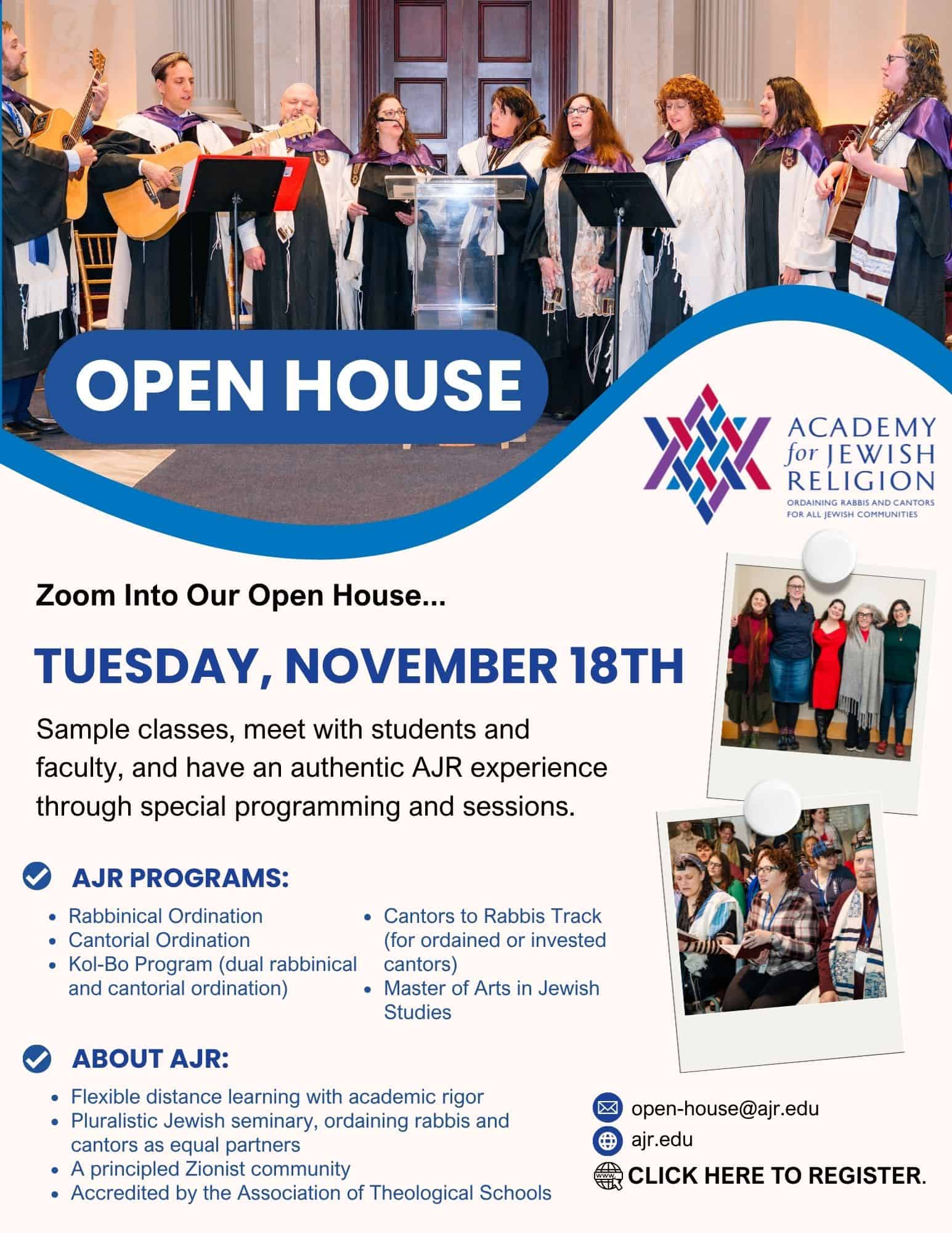All sessions are on Zoom. Please note that times indicated below are ET.
- The Spiritual Dialogue: Our Prayer and Our Learning – Rabbi Jeffrey Segelman
- Advanced Nusah Shabbat I – Cantor Sol Zim
- Introduction to Biblical Hebrew – Rabbi Peg Kershenbaum
Learn more about our programs of study, curriculum, distance learning, and the AJR application process.
Please feel free to use this time to enjoy your lunch during these conversations.
- Intermediate Codes – Rabbi David Almog
- Cantillation-Torah & Haftarah – Cantor Robin Joseph
- Jewish Dreamwork – Rabbi Jill Hammer, PhD
- Mechina II – Ayelet Amir Rein
2:10 – 3:20 pm
Pluralism at AJR and Pluralistic Leadership in Today’s Jewish Community
Dr. Ora Horn Prouser
Experience our spirited tefillot.
- Ruth, Esther, and Lamentations – Dr. Job Jindo
- Intermediate Talmud I – Rabbi Jeff Hoffman, DHL
- Advanced Nusah Shabbat I – Cantor Lisa Klinger-Kantor
- Questions About Taking Classes This Spring? Rabbinic, MA, and Kol-Bo – Dr. Ora Horn Prouser, Rabbi Matthew Goldstone, PhD
- AJR’s Cantorial Program and Your Place In It, Cantorial and Kol-Bo – Cantor Michael Kasper
Have a great day!
Course Descriptions
This course is about a dialogue involving prayer and learning. We will explore the deep meaning of prayer as an expression of ourselves to God and learning as an act of embracing God’s expression of God’s self to us. Most importantly, we will focus on how we create meaningful prayer services and learning experiences for others, making sure that this work does not come at the expense of our own spiritual dialogue and spiritual growth.
This course gives an in depth and extensive study of the vast liturgy of the Kabbalat Shabbat and Ma’ariv LeShabbat services. Students will develop and master a deep understanding of the nusah and special motifs in the opening Kabbalat Shabbat Service. Students will learn, in depth, the many nushaot, motifs, and participatory melodies of the Lekha Dodi section and will master and attain a deep understanding of the Ma’ariv leShabbat service by learning and demonstrating strong competence in the nusah special motifs so as to lead a service.
Introduction to Biblical Hebrew: examination of and exercise in the grammar, syntax and vocabulary of Biblical Hebrew, for the development of competence in understanding and translating the classical Biblical texts (with some attention to major differences between BH, Rabbinic and Modern Hebrew). Objectives: by the end of this course, students will be able to identify all parts of speech, including all the major binyanim in all their forms as they occur in prose passages of the Tanakh. They will be able to use BDB efficiently and accurately to find unfamiliar vocabulary by applying information learned about the forms and structures of different parts of speech. Students will learn to use a biblical concordance and Sefaria.com to produce a word study. They will be able to translate connected biblical prose passages accurately with the help of BDB and give analyses of specified words and constructions. Students will be able to use major conjunctive and disjunctive cantillation signs to aid in correct phrasing of syntactic units of the texts examined. And, if all goes according to plan, we will even enjoy the process!
Prerequisite: two trimesters of Introduction to Codes
This course provides a comprehensive presentation, study, and practical usage of Torah and Haftarah cantillation. Students will examine the history, structure, and musical notation and phrasing of common Ashkenazi trope/cantillation. Emphasis will be placed on learning the musical notation and phrasing of Torah and Haftarah cantillation and applying it to text.
From Genesis to the Talmud, from the Zohar to folklore, Jews have used dreams as a means of self-understanding and a vehicle for divine revelation. This class will have two components: first, we will read and analyze a variety of Jewish texts, rituals, and prayers on dreaming to understand the role of dreaming in Jewish practice. We’ll also consider several contemporary Jewish dream practices. Second, we will work with our own dreams to understand dreamwork as a spiritual practice and as a pastoral resource. We will discuss and practice Jewish rituals related to dreaming, and hold dream circles to mine our own dreams for wisdom and spiritual growth. Students should bring a dream journal with at least four or five recorded dreams to the first session. This course counts as a Spirituality elective or as a general elective.
This course is a continuation of Mechina Hebrew I and builds upon the foundational grammar already covered. The students will continue to work on developing communication skills in Modern Hebrew. They will be introduced to more advanced grammatical patterns, and new vocabulary and continue to improve their writing, reading, and conversational skills.
This course offers a close critical reading of Ruth, Esther, and Lamentations, three biblical texts centered on female figures whose stories raise enduring questions about identity, belonging, and moral agency. Through these narratives, students will develop interpretive skills and be able to articulate the structure, purpose, and theological outlook of each text, as well as identify ways in which these works shed light on the human condition today. Topics of discussion include rights discourse vs. identity discourse, the eclipse of God and emergence of human agency, empathy and justice, enticement and manipulation, hatred and metonymic thinking, identity and violence, love and forgiveness, politics and strangers, primordial and multicultural identity, the sense of the transcendent, “kosher adultery,” and Lekha Dodi.


